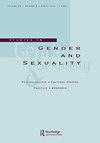Uncreated Gender and Interpsychic Overkill
Q3 Social Sciences
引用次数: 0
Abstract
ABSTRACT Amir’s dialectic of continuous and emergent gender is reviewed. Uncreated gender is posited as the excess of that dialectic. Male pronouns are questioned for a patient who lacks a gendered self through which to claim those pronouns as their own. Interpsychic overkill is defined as a process in which psychoanalytic epistemologies overkill a patient who is already psychopolitically deadened.未经处理的性别与跨心理过度杀戮
摘要:回顾了阿米尔关于连续性和涌现性性别的辩证法。未经处理的性别被认为是辩证法的过度。男性代词被质疑为缺乏性别自我的患者,通过性别自我来声称这些代词是他们自己的。心理过度杀伤被定义为心理分析认识论过度杀伤已经在心理政治上麻木的患者的过程。
本文章由计算机程序翻译,如有差异,请以英文原文为准。
求助全文
约1分钟内获得全文
求助全文
来源期刊

Studies in Gender and Sexuality
Social Sciences-Gender Studies
CiteScore
0.80
自引率
0.00%
发文量
15
期刊介绍:
Beginning in the final two decades of the 20th century, the study of gender and sexuality has been revived from a variety of directions: the traditions of feminist scholarship, postclassical and postmodern psychoanalytic theory, developmental research, and cultural studies have all contributed to renewed fascination with those powerfully formative aspects of subjectivity that fall within the rubric of "gender" and "sexuality." Clinicians, for their part, have returned to gender and sexuality with heightened sensitivity to the role of these constructs in the treatment situation, including the richly variegated ways in which assumptions about gender and sexuality enter into our understandings of "normality" and "pathology."
 求助内容:
求助内容: 应助结果提醒方式:
应助结果提醒方式:


